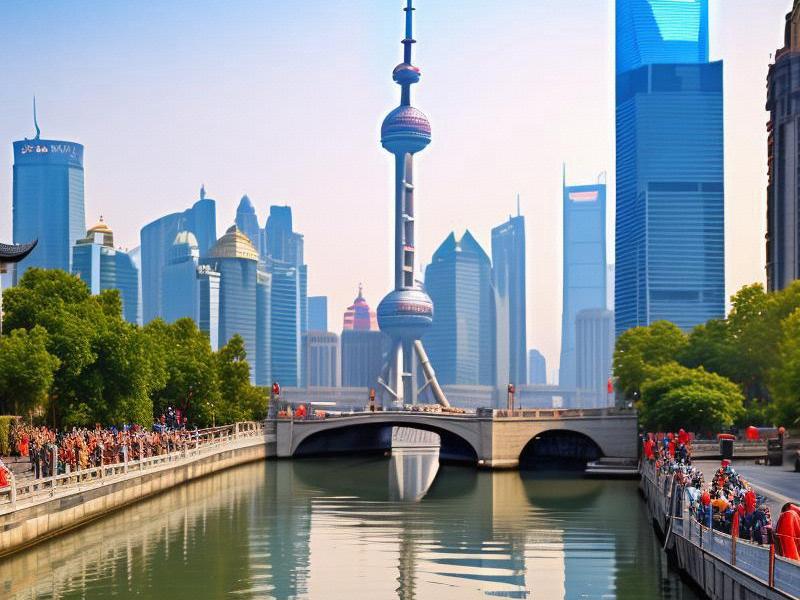
Nestled along the eastern coast of China, Shanghai stands as a beacon of modernity and a bridge to the country's rich historical past. As the largest city in China and one of the world's most populous urban centers, Shanghai is a dynamic metropolis that seamlessly blends tradition with innovation. This article aims to explore the various facets of Shanghai, highlighting its urban development, cultural heritage, and its role as a global innovation hub.
The skyline of Shanghai is a testament to its rapid urban development. The iconic Oriental Pearl Tower, the Jin Mao Tower, and the Shanghai Tower are just a few examples of the city's architectural prowess. These skyscrapers, along with the bustling Pudong Financial District, symbolize Shanghai's transformation from a modest fishing village to a global financial center. The city's urban planning is a model of efficiency and sustainability, with green spaces, efficient public transportation, and smart city technologies integrated into its design.
Shanghai's economic prowess is unparalleled. It is the financial capital of China, hosting the Shanghai Stock Exchange and numerous multinational corporations. The city's free trade zone has attracted businesses from around the world, making it a hub for international trade and investment. Shanghai's economy is diverse, with strengths in finance, technology, manufacturing, and services. The city's GDP ranks among the highest in the world, and its per capita income reflects the high standard of living enjoyed by its residents.
Despite its modernity, Shanghai is deeply rooted in tradition. The city is home to some of the most beautiful and well-preserved classical Chinese gardens, such as the Yu Garden and the Summer Palace. These gardens offer a glimpse into the city's rich cultural heritage and the harmonious blend of nature and architecture that has defined Chinese culture for centuries. The Bund, a historic waterfront area, showcases the city's colonial past with its mix of Gothic, Baroque, and Romanesque-style buildings.
爱上海论坛 Shanghai's cultural scene is vibrant and diverse. The city is a melting pot of different cultures, with a significant expatriate population and a thriving arts community. The Shanghai Museum is renowned for its extensive collection of Chinese art, including ancient ceramics, calligraphy, and paintings. The city's theaters and concert halls host a wide range of performances, from traditional Chinese opera to contemporary music and dance. The annual Shanghai International Film Festival is one of the most prestigious film festivals in Asia, attracting filmmakers and audiences from around the world.
Innovation is at the heart of Shanghai's identity. The city has embraced technology and innovation as key drivers of its development. Zhangjiang Hi-Tech Park is a hub for research and development, home to numerous high-tech companies and research institutions. Shanghai's government has implemented policies to foster innovation, such as tax incentives for startups and investments in digital infrastructure. The city's commitment to innovation is evident in its smart city initiatives, which use technology to improve the quality of life for its residents.
Shanghai's position as a global innovation hub is further strengthened by its role in international collaborations. The city is a member of the Global Innovation Cities Network, which promotes innovation and knowledge sharing among cities around the world. Shanghai's universities and research institutions are involved in numerous international research projects, contributing to advancements in science, technology, and medicine.
爱上海同城对对碰交友论坛 The people of Shanghai are the lifeblood of the city. With a population of over 24 million, Shanghai is one of the most cosmopolitan cities in the world. The city's residents come from diverse backgrounds, reflecting the city's history as a port of entry for trade and immigration. The local dialect, Shanghainese, is a unique blend of Chinese dialects, and the city's cuisine is renowned for its flavors and variety. From the famous Xiaolongbao (soup dumplings) to the delicate Shaoxing wine, Shanghai's culinary scene is a testament to the city's rich cultural heritage.
Shanghai's role in global affairs is significant. As a member of the United Nations and a key player in international organizations, the city has a voice in addressing global challenges such as climate change, economic inequality, and technological advancements. Shanghai's leadership in sustainable urban development serves as a model for other cities around the world. The city's commitment to reducing carbon emissions, improving air quality, and promoting green energy is evident in its policies and initiatives.
The future of Shanghai is bright, with continued growth and development on the horizon. The city's government has outlined ambitious plans for the coming decades, focusing on innovation, sustainability, and improving the quality of life for its residents. Shanghai's vision for the future includes the construction of smart infrastructure, the expansion of its transportation network, and the promotion of cultural exchange and international cooperation.
爱上海同城419 However, Shanghai also faces challenges in its journey towards a sustainable future. The rapid pace of urbanization has led to issues such as housing shortages, traffic congestion, and environmental concerns. The city's government is addressing these challenges through innovative solutions, such as the development of affordable housing, the promotion of public transportation, and the implementation of environmental regulations.
Shanghai's story is one of resilience, adaptability, and innovation. From its humble beginnings as a fishing village to its current status as a global metropolis, Shanghai has transformed itself into a symbol of China's rise on the world stage. The city's unique blend of tradition and modernity, its economic prowess, and its vibrant cultural scene make it a fascinating subject for analysis.
In conclusion, Shanghai is a dynamic metropolis that exemplifies the best of China's rapid urban development and rich cultural heritage. The city's skyline, economic strength, cultural diversity, and commitment to innovation make it a global leader in its own right. As Shanghai continues to grow and evolve, it remains a beacon of hope and opportunity for millions of people around the world.
